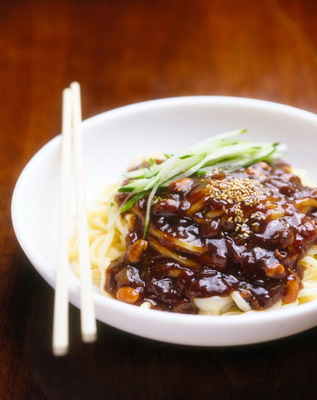Chinese food finds favor with its flavor
Updated: 2011-09-19 10:58
By Dong Tian (China Daily)
|
|||||||||||
|
A bowl of Zhajiangmian at a Beijing restaurant. Sales of Zhajiangmian, a Chinese style black bean sauce with noodles, potatoes and vegetable, are brisk after United States Vice-President Joe Biden and his entourage ordered the dish at a small restaurant during their recent visit to Beijing. [Photo / China Daily] |
BEIJING - "No visit to China is complete if you miss dining on Chinese food," said Carlos Irlan, a visitor from the United Kingdom enjoying his deep-fried dumplings in Wangfujing food alley in downtown Beijing.
Located in Dongcheng district, the alley is one of the most well-known and prosperous food streets in Beijing. It packs various kinds of Chinese food ranging from xiaolongbao (traditional steamed dumplings originating from Shanghai) and roast duck to deep-fried insects, star fish and scorpions, often threaded alive on skewers.
Carlos' favorite is deep-fried scorpion, a crunchy and novel delicacy for most Westerners. His friend Alice Warren chooses a more traditional dish - Peking roast duck. "I've had roast duck several times in the United States but, as my friend said, Quanjude Peking Roast Duck is the tastiest I've ever eaten," she said.
The Beijing-headquartered Quanjude (Group) Co Ltd enjoys an international reputation for its special roasting technique. The crisp and juicy grain-fed duck attracts both overseas and Chinese consumers to its restaurants throughout the world every day.
In Quanjude's Hepingmen restaurant in the Xuanwu district of Beijing, a duck is wheeled in on a trolley, and a chef expertly carves it in front of the guests while a waitress places a bamboo steamer full of pancakes on the table. When the duck, neatly sliced, is served, the waitress shows the customers how to eat it.
"Heaven! It is so delicious!" Joyce Jiang, a student from Griffith University, in Queensland, Australia, commented. "It melts in the mouth."
"Foreign tourists like traditional Chinese food most," said Zhao Guofu, who runs a food stall in Wangfujing food alley. Zhao cited an old saying: The more things are traditional in a country, the more they are international. "Now I can tell it's really true. I sell at least 50 bowls of bean paste cake in just half a day of business."
According to the China Cuisine Association, the annual retail sales of China's catering industry now amount to about 2 trillion yuan ($313 million). In Beijing's Quanjude Roast Duck Hepingmen restaurant alone, for example, the sales amounted to nearly 685,000 yuan a day on average last year. Many of the customers are from overseas and include travelers and those who live and work in the capital city.
Foreigners living in Beijing now number about 170,000, making up more than 1 percent of the city's population, according to Beijing municipal government statistics. Given that the number is growing, it represents a huge potential for the Chinese catering market.
Chinese food is famous for its great variety and the delicate combination of color, aroma and taste, representing Chinese cultural traditions, agricultural customs and geographical conditions. To many foreign tourists, Chinese food is very appealing. It excites curiosity about the origins and the meaning, even the procedure, for making the dishes and leads them to inquire about China's extensive and lively history.
Chinese traditional foods are integral to modern Chinese society and continue to inspire the world. After US Vice-President Joe Biden's recent visit to Beijing, sales of zhajiangmian noodles, which Biden and his entourage ordered, are surging in Beijing restaurants. The dish is now known as "Biden's set" and aroused international media interest.
"Next time I'm in Beijing, I'll try Biden's set for lunch! Can't wait!" a Western netizen said on the China Daily website.
Sheldon, a character from popular US TV series "Big Bang Theory", eats Chinese tangerine chicken every Saturday. Many of his fans now order the dish in Chinese restaurants. For Chinese food, it seems the only way is up.
In addition, the State Food and Drug Administration is planing to use cartoon faces - smiling or unhappy - to grade restaurants and delis based on the evaluation of their food safety conditions, said a Xinhua report on Sunday.
The smiling face will represent excellent, the straight face means good and the unhappy face indicates average, according the draft which is currently opening for public opinions.
The grading will be based on evaluations on food safety factors ranging from environment, facilities, food materials, processing, to food additive and tableware disinfection, according to the draft, the report said.














